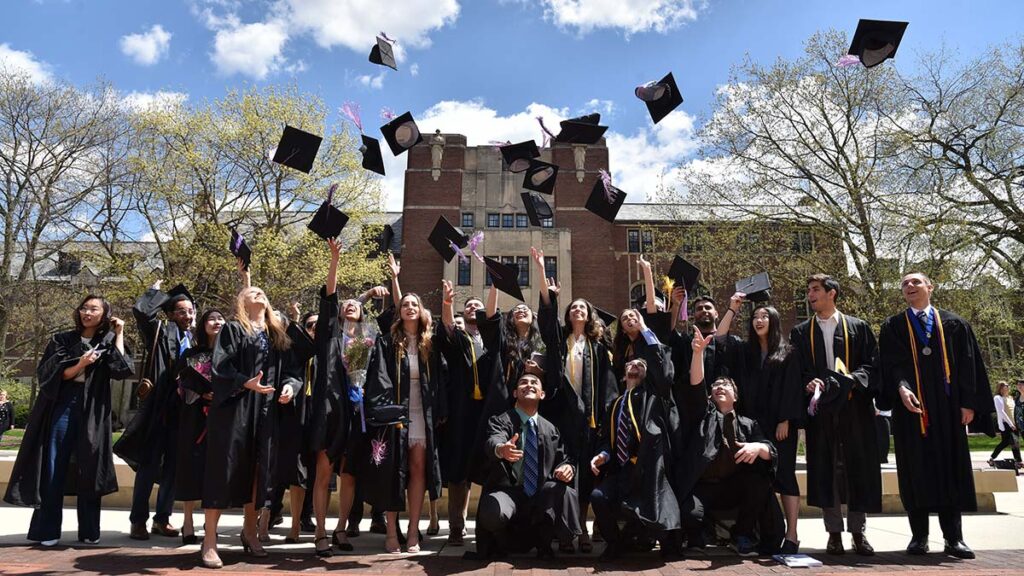
- This event has passed.
Lecture & Panel Discussion: Ukraine Reconstruction
March 28 at 4:30 pm - 6:50 pm
The Russian War against Ukraine ruins the cities and rich architectural heritage, monuments, and urban space. The lives of all Ukrainians have been jeopardized by this war that continues to brutally consume Ukrainian lives and territory. Over 6 million internally displaced people need affordable housing. While the rebuilding of Ukraine must be Ukrainian-led, it must be supported by an international community of expertise, funding resources, and conveyed with respect to the self-determination of the Ukrainian people.
The seminar Ukraine Reconstruction aims to discuss the current situation of damages of cities, architectural heritage and housing, thus convenes a keynote speaker and a panel of experts on topics of urbanism, architecture, cultural heritage.
The proceedings encompass the rich architectural heritage of Ukraine, lay witness to the present devastation, and support the future hope, both of grass-roots reconstruction efforts, and visionary Ukrainian-led planning for a radical, sustainable, and inclusive reconception of architectural and urban space in Ukraine. The aim of this seminar is to create a space for a dialogue, collaboration, to invite broader awareness and understanding of a war with global consequences, and to build new bridges between faculty, fellows, and students of University of Michigan and Ukrainian architectural education and scholars.
Convening a seminar on Ukrainian Reconstruction provides a unique opportunity for Taubman College to engage in a global design discourse on the ongoing crisis and forefront the understanding of how the architectural memory, heritage and culture of a nation under siege can be preserved.
The student works from ARCH 503/603/823 Architecture of Soviet Ukraine and thesis students of Professor Matias del Campo to be featured in the seminar presentation. This project aligns with the broader mission of Taubman College to serve the community, through dissemination of knowledge, exhibitions, and a greater understanding of global crises with global impact. Moreover, this seminar is aimed to be generative of ideas, visions and designs for the future efforts to rebuilding Ukraine, and Taubman college is at the forefront of the global architectural discourse tackling complex challenges in the intersection of architecture, destruction and restoration, heritage and cultural memory.
Event Timeline
- 4:30 pm – 5:30 pm – Keynote lecture and Q&A – Oleg Drozdov
- 5:30 pm – 5:50 pm – break – students speak about their course projects on architecture in Ukraine, poster exhibition
- 5:50 pm – 6:50 pm – panel discussion – panelists: Oleg Drozdov, Christina Crawford, Andrew Herscher, Matias del Campo, moderator – Oksana Chabanyuk
Speakers
Oleg Drozdov
Drozdov&Partners, Kharkiv School of Architecture (KhSA), Ro3Kvit: urban coalition for Ukraine
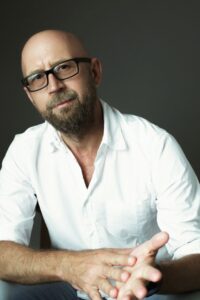 Oleg Drozdov is an architect, urbanist, artist, academic, European Commission, and EU Mies van der Rohe Award expert. Since 1997, he has been the founder and Chief Architect of the Drozdov&Partners architectural office. Co-founder, President of the Kharkiv School of Architecture, Studio tutor. Since 2020, he is a co-founder and the Chief Architect of the Paragraph studio of architecture and urbanism in Montreux, Switzerland. Since 2022, European Commission expert Co-founder of Ro3Kvit: urban coalition for Ukraine.
Oleg Drozdov is an architect, urbanist, artist, academic, European Commission, and EU Mies van der Rohe Award expert. Since 1997, he has been the founder and Chief Architect of the Drozdov&Partners architectural office. Co-founder, President of the Kharkiv School of Architecture, Studio tutor. Since 2020, he is a co-founder and the Chief Architect of the Paragraph studio of architecture and urbanism in Montreux, Switzerland. Since 2022, European Commission expert Co-founder of Ro3Kvit: urban coalition for Ukraine.
In 2015, Drozdov curated the Terralogia art project at Shcherbenko Art Centre, Kyiv, and YermilovCentre for Contemporary Art, Kharkiv, Ukraine. In 2012, he curated the Circumstances project representing Ukraine at the Moscow Architecture Biennale, winning the First Prize in the “Best Curated Project” nomination. In 2011, Drozdov was the co-author and critic of the Columbia University GSAPP semester project. In 2005, he represented Ukraine at the Flood International Architecture Biennale Rotterdam (IABR) with the “Monisto” project. In 2003, Drozdov initiated the Architectural Ambulance international project design workshop, in Kharkiv, a ground-breaking event for Ukraine.
The most widely discussed project by Drozdov is the Podil Theatre reconstruction in Kyiv, Ukraine: it showcased issues crucial for Ukrainian society and expanded the limits of traditional architectural aesthetics. This project received several awards and, in 2019, was nominated for a prestigious EU prize for architecture, the EU Mies van der Rohe Award. In 2021, two new objects by Drozdov&Partners were nominated for the EU Mies van der Rohe Award: the VG Horse Club and the Sense Dental Clinic.
Drozdov is positive that architects must develop their sense of place, culture, climate, and time. To this end, his whole team is engaged in international projects in France, Korea, Kuwait, Spain, Switzerland, the USA, and other countries, which expand their worldview and provide a better understanding of themselves and their own culture. The key project method practiced by the team is discussion and peer revision. Another crucial factor for the team’s development is a regular exchange of functions between the architects: their work ranges from urban design and large-scale area research to interior design and even scenography. This practice provides the team with a broad scope of competencies and experience, which can be applied to expand their understanding of the situation, visibly improve the quality of their solutions, and make them more insightful.
Christina Crawford
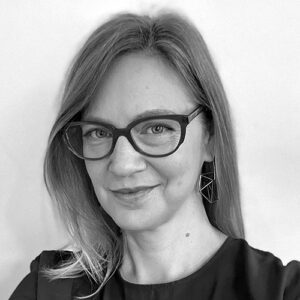 Christina E. Crawford is Masse-Martin NEH Professor of Art History (2022-2025), Associate Professor Modern and Contemporary Architecture in the Art History Department at Emory University, Associated Faculty of the Emory History Department, Faculty of Emory’s Russian, East European, and Eurasian Studies Program, and 2021 recipient of the Emory Williams Distinguished Undergraduate Teaching Award. In 2023 she was visiting faculty at the Kharkiv School of Architecture (Ukraine).
Christina E. Crawford is Masse-Martin NEH Professor of Art History (2022-2025), Associate Professor Modern and Contemporary Architecture in the Art History Department at Emory University, Associated Faculty of the Emory History Department, Faculty of Emory’s Russian, East European, and Eurasian Studies Program, and 2021 recipient of the Emory Williams Distinguished Undergraduate Teaching Award. In 2023 she was visiting faculty at the Kharkiv School of Architecture (Ukraine).
Her research focuses on the transnational exchange of ideas about housing and urban form in the twentieth century. She is the author of Spatial Revolution: Architecture and Planning in the Early Soviet Union (2022), where she establishes the foundations of early Soviet urban theory and practice in three seminal industrial sites: Baku, Magnitogorsk, and Kharkiv. She is the co-editor of Detroit-Moscow-Detroit: An Architecture for Industrialization, 1917-1945 (2023). Her new research explores interwar exchanges of housing expertise between the US and Europe, using Atlanta, Georgia as a primary node. She received her Ph.D. and M.Arch from Harvard University, and her BA from Yale University.
Andrew Herscher
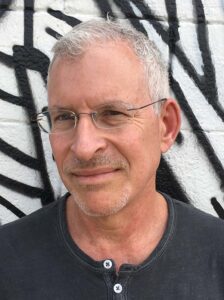 Andrew Herscher is a Professor of Architecture at the University of Michigan. Before his career in academia, he worked extensively in post-war contexts in the former Yugoslavia, serving as a researcher and expert witness for the International Criminal Tribunal for the Former Yugoslavia, co-founder of the Kosovo Cultural Heritage Project, and International Co-Director of the Department of Culture in the United Nations Mission in Kosovo. His scholarly work on issues related to architecture, political conflict, and humanitarianism include Violence Taking Place: The Architecture of the Kosovo Conflict, Displacements: Architecture and Refugee, and The Global Shelter Imaginary: IKEA Humanitarianism and Rightless Relief, co-authored with Daniel Bertrand Monk.
Andrew Herscher is a Professor of Architecture at the University of Michigan. Before his career in academia, he worked extensively in post-war contexts in the former Yugoslavia, serving as a researcher and expert witness for the International Criminal Tribunal for the Former Yugoslavia, co-founder of the Kosovo Cultural Heritage Project, and International Co-Director of the Department of Culture in the United Nations Mission in Kosovo. His scholarly work on issues related to architecture, political conflict, and humanitarianism include Violence Taking Place: The Architecture of the Kosovo Conflict, Displacements: Architecture and Refugee, and The Global Shelter Imaginary: IKEA Humanitarianism and Rightless Relief, co-authored with Daniel Bertrand Monk.
Matias del Campo
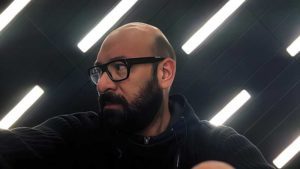 Dr. Matias del Campo is a registered architect, designer, and educator. He is an Associate Professor at Taubman College for Architecture and Urban Planning, University of Michigan, and director of the AR2IL – The Architecture and Artificial Intelligence Laboratory at UoM. He conducts research on advanced design methods in architecture, primarily through the application of Artificial Intelligence techniques in collaboration with the Computer Science department and Michigan Robotics – of which he is also an affiliated faculty member. Matias del Campo is the co-founder of the architecture practice SPAN. Their award-winning architectural designs are informed by advanced geometry, computational methodologies, and philosophical inquiry.
Dr. Matias del Campo is a registered architect, designer, and educator. He is an Associate Professor at Taubman College for Architecture and Urban Planning, University of Michigan, and director of the AR2IL – The Architecture and Artificial Intelligence Laboratory at UoM. He conducts research on advanced design methods in architecture, primarily through the application of Artificial Intelligence techniques in collaboration with the Computer Science department and Michigan Robotics – of which he is also an affiliated faculty member. Matias del Campo is the co-founder of the architecture practice SPAN. Their award-winning architectural designs are informed by advanced geometry, computational methodologies, and philosophical inquiry.
Oksana Chabanyuk
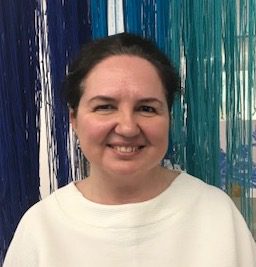 Dr. Oksana Chabanyuk is an Associate Professor of Architecture at O.M. Beketov National University of Urban Economy, Kharkiv, Ukraine. She is a Weiser Center for Europe and Eurasia Fellow at the University of Michigan. During her fellowship, she teaches elective courses on the history of Eastern European architecture and urban planning, and a required course on the history of architecture at the Taubman College of Architecture and Urban Planning. Oksana Chabanyuk is an External expert at the Research Executive Agency, European Climate, Infrastructure and Environment Executive Agency in the European Commission. She recently published the book chapters are in the books: Detroit-Moscow-Detroit: An Architecture for Industrialization, 1917-1945 (MIT Press, 2023); Large Housing Estates under Socialism Experiences and Perspectives on Sustainable Development of Mass Housing Districts ( transcript Verlag, 2024). Her research is focused on standardization and early industrialization in the USSR, prefabrication in housing construction, post-socialist housing, social housing, and regeneration of residential areas. She is an architect and received her BA in Architecture, MA in Urban Planning, and PhD at the National University Lviv Polytechnic, Ukraine.
Dr. Oksana Chabanyuk is an Associate Professor of Architecture at O.M. Beketov National University of Urban Economy, Kharkiv, Ukraine. She is a Weiser Center for Europe and Eurasia Fellow at the University of Michigan. During her fellowship, she teaches elective courses on the history of Eastern European architecture and urban planning, and a required course on the history of architecture at the Taubman College of Architecture and Urban Planning. Oksana Chabanyuk is an External expert at the Research Executive Agency, European Climate, Infrastructure and Environment Executive Agency in the European Commission. She recently published the book chapters are in the books: Detroit-Moscow-Detroit: An Architecture for Industrialization, 1917-1945 (MIT Press, 2023); Large Housing Estates under Socialism Experiences and Perspectives on Sustainable Development of Mass Housing Districts ( transcript Verlag, 2024). Her research is focused on standardization and early industrialization in the USSR, prefabrication in housing construction, post-socialist housing, social housing, and regeneration of residential areas. She is an architect and received her BA in Architecture, MA in Urban Planning, and PhD at the National University Lviv Polytechnic, Ukraine.

